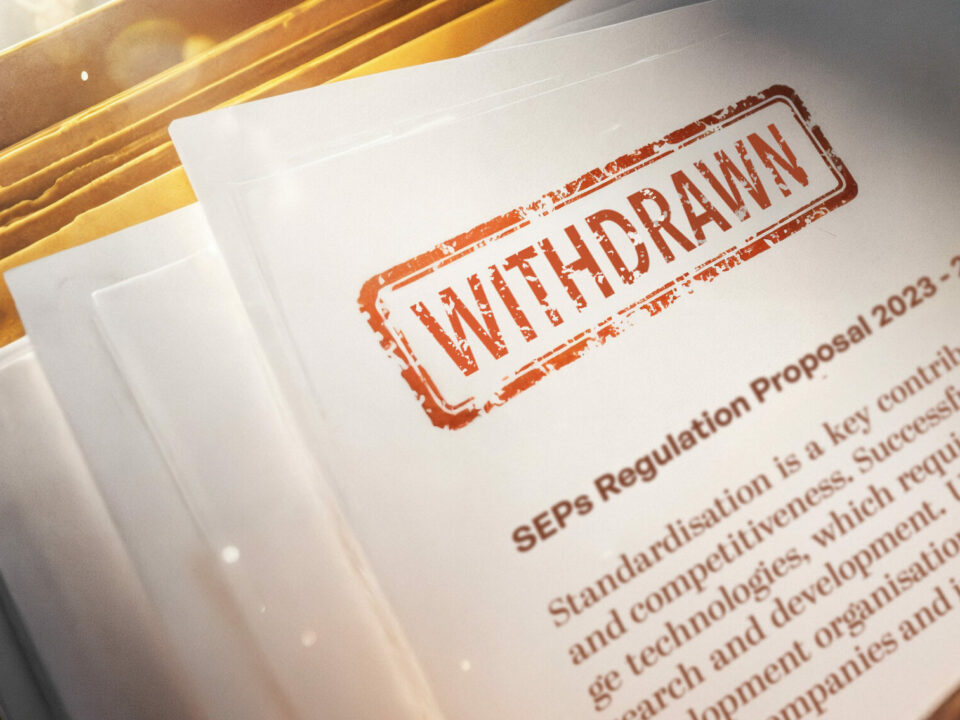MSMEs: Why IP matters for Deep Tech SMEs, startups and scale-ups
The 27th of June marks World Micro-, Small and Medium-Sized Enterprises Day. To help celebrate it, IP Europe asked its SME Chair, Rubén Bonet, Co-Founder and Executive Chairman of Fractus, to describe why patents and other intellectual property (IP) are vital assets for any Deep Tech SME or startup aiming to scale up and compete in today’s innovation-driven markets.
Securing a patent not only protects a company’s unique inventions from imitation, but also serves as a powerful signal to investors, partners, and customers that the SME is building a defensible and valuable business. For startups and SMEs, a strong patent portfolio can open doors to funding, facilitate technology licensing, and provide the exclusive market position needed to recoup R&D investments—especially in sectors like Deep Tech, biotech, and advanced engineering. In Europe, SMEs that strategically manage their IP are significantly more likely to attract investment and achieve sustainable growth. Ultimately, integrating patent and IP strategy into their business models is essential for SMEs and startups to scale, innovate, and thrive in competitive global markets.
Read the Q&A below to learn more about Fractus’s experience working with the Universitat Politecnica de Catalunya-Barcelona Tech and startups in the UPC Deep Tech Hub – and share it with anyone you think should read it!
How important are intellectual property and licensing for SMEs scaling up in the Deep Tech space?
In the deep tech sector—where breakthroughs in areas like quantum computing, advanced materials, synthetic biology and robotics often demand enormous upfront R&D investments—intellectual property (IP) and licensing aren’t just minor legal details, they’re the backbone of scalable growth.
Deep Tech projects often need many years of expensive research before they can sell anything. Patents and trade secrets give SME startups and scale-ups a time when only they can use their invention. That “exclusive period” helps them earn back their research costs and convinces investors to fund the project. If there were no protection and other companies could just copy their work, investors—and therefore the founders—would be much less willing to support such risky, cutting-edge ideas.
No single company can handle every part of a complex Deep Tech system on its own. Licensing lets an Deep Tech SME make money from its key inventions by giving other companies permission to use, improve, or sell the technology. For example, a lab might discover a new super-strong material and then license it to electronics makers, while still keeping the right to license it later to aerospace firms. These “piece-by-piece” deals help the technology spread faster, reach more markets, and share the costs and risks of further development.
What motivated Fractus to partner with the Universitat Politecnica de Catalunya-Barcelona Tech (UPC)1 to create the Deep Tech hub? A lot of the technologies mentioned don’t seem directly related to Fractus’s core business.
In 2022, Fractus and the UPC created the Fractus-UPC Deep Tech hub to foster innovation, collaboration and entrepreneurship in the field of deep technologies. Based on our combined experience, we are capable of addressing the market needs through technologies that can reach the market and specially the people.
The relationship with the UPC actually started 25 years ago. Fractus was one of the first spin-offs of the university that developed antenna technologies, which are in the field of deep tech. This collaboration brought together Fractus’ experience in licensing technologies and the UPC’s leadership in research in fields such as artificial intelligence, 5G & 6G networks and cybersecurity.
At the Fractus-UPC Deep Tech hub we work to create an ecosystem that drives research, innovation and entrepreneurship in deep technologies, to create solutions in areas such as healthcare, telecom and sustainability to have a real impact in the society. It is a form of diversification, exploring new areas within the deep technologies. Fractus has experience in developing technologies related to medical devices from the past, but this is a step forward.
Beyond Fractus, are there any other SME success stories of Universitat Politecnica de Catalunya-Barcelona (UPC) Deep Tech initiatives that have found commercial success?
Sure! Take the example of Mitiga Solutions, which was born from UPC and the Barcelona Supercomputing Center. Mitiga has raised more than €21 million (including a €8 million Series A funding) to commercialise software predicting atmospheric dispersion impacts for air-traffic management.
How does the Fractus-UPC Deep Tech hub fit into the bigger picture of European initiatives related to start-ups and scale-ups?
Europe wants to turn great research into new companies, especially small and medium-sized companies (SMEs). The Fractus-UPC Deep Tech Hub in Barcelona is one of the local “innovation hubs” that help make that happen.
Brussels runs big funding and support schemes like EU Startup and Scaleup Strategy, ‘Choose Europe to Start and Scale’, to make Europe a great place to start and grow global technology-driven companies. But to actually use them, startups need hands-on help nearby. Fractus-UPC hub gives companies in Catalonia the labs, expert advice and coaching they need.
Helping researchers access finance: One of the activities is the Next Frontier Founders program. It is an acceleration and investment program, promoted by the Fractus-UPC Deep Tech Hub, which supports deep-tech spin-offs and startups with expert mentoring, training, networking, and the opportunity to pitch at 4YFN, which stands for “Four Years from Now”, at the Mobile World Congress in Barcelona. It is aimed at UPC students, doctoral candidates, alumni, or research staff who have created or are creating a technology company.
There are about 200 “Digital Innovation Hubs” around Europe. Each hub has its own technical focus—Fractus-UPC Deep Tech hub is great at 5G / 6G networks, healthcare, artificial intelligence and so on. Because they’re all connected, a startup in Barcelona can easily get access to, say, AI labs in Berlin or advanced-manufacturing facilities in Finland without reinventing the wheel. More collaboration between the hubs would be essential.
Once a Deep Tech startup starts making real money, it needs new skills, markets and investors. Fractus-UPC Deep Tech hub points companies toward connecting them with EU venture networks and guide them through strategic IP business plans. Getting ready to scale up!
The Fractus-UPC Deep Tech Hub is more than just a local incubator. It’s Spain’s doorway into Europe’s big plan for growing deep-tech startups—from first lab tests all the way to selling products worldwide.
What can the European Union or national governments do to raise awareness of the value of intellectual property in attracting investors?
Since Fractus is based in Catalonia, we can use examples from regional agencies and entities such as Acció and Barcelona Activa and to explain why protecting ideas matter:
Free IP Clinics and one-on-one advice: Agencies like Acció already run special advisory services where startups can get personal help to file patents, trademarks or utility models at low or no cost. Governments could fund more of these “IP clinics,” set up in regional offices or online, so every small company can learn why legal protection is key before talking to investors. The European IP Helpdesk offers free phone and online support in all EU languages—but it’s mostly remote and aimed at slightly more mature companies. One improvement could be to combine the best of both—Acció’s face-to-face help with the Helpdesk’s multilingual online tools. For example, setting up monthly live webinars in multiple languages that connect local clinics to EU experts.
IP training in startup programs: Barcelona Activa’s Deep Tech Node shows how joining an incubator or accelerator is a great opportunity to mix with investors and mentors. Adding short, hands-on IP workshops into these programs—where teams actually draft a mock patent or trademark application—helps founders understand how patents can boost a pitch. Governments can require or subsidize these modules in all public startup initiatives. Students at the Universitat Politècnica de Catalunya can attend a “Technology Asset Management” course where they can learn about the importance of IP through several real cases.
EU (EIC Accelerator Coaching): gives deep-tech teams dedicated IP mentors as part of preparing their grant applications, but these sessions usually happen only once or twice before the funding decision. One improvement could be to turn IP training into an ongoing “IP Bootcamp” that starts at application time and continues with quarterly check-ins. That way, founders learn early how patent strategy evolves as their product matures.
Highlight IP at big tech events: At events like the Mobile World Congress dedicating a corner to IP-themed talks, games or quick 15-minute “IP check-ups” would make the concept more visible—and normal—among fast-moving startups and could bring tech companies, students and investors together. National governments could co-sponsor these zones and invite patent office experts to join the fun.
EU (IP Day & IP Week): marks European IP Day (April 26) and organizes IP Week with panels all across Europe—but these aren’t always tied to tech fairs. One improvement could be to merge the calendars, dedicating a “Mobile World IP Day” on April 26 each year with keynote speeches, live patent-drafting challenges, and investor-startup speed-dating meetings focused on protected innovations.
Clear, online IP toolkits and success stories: Few startup founders know where to start when they hear “patent” or “licence.” Governments can build simple websites—filled with checklists, short videos and real success stories of local startups whose valuations jumped after filing patents. Linking these toolkits to grant portals (so you apply for R&D money and IP‐support money in one place) would make it easier for investors to see that a protected innovation is a safer bet. The EUIPO runs an online portal with easy videos and downloadable checklists in 23 EU languages—but it’s generic and not tailored to deep-tech.
Grant bonuses for protected innovation: Finally, when EU or national R&D grants (like Horizon Europe) are awarded, winners who commit to patenting or licensing can get a small extra top-up. That bonus both nudges founders to take IP seriously and signals to investors that the company is already building a defensible advantage. Horizon Europe grants sometimes cover IP costs, but only up to a fixed ceiling and only if you ask for it in advance. One improvement could be to introduce a “patent milestone bonus” in which at each key stage (first application, grant, first license signed), both Catalan and EU grants release an extra 5 % fund boost. This keeps startups thinking about IP as they grow, not just at the beginning.
By weaving IP protection into free advice (Acció), startup training (Barcelona Activa), major tech fairs (Mobile World Congress) and online toolkits—and by sweetening grants for covered ideas—governments can make “patents and licenses” feel as natural as business plans and pitch decks both for founders and for the people who back them.




